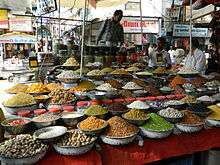Manek Chowk (Ahmedabad)
 Street food stalls at night | |
| Addresses | within walled city, near Bhadra Fort |
|---|---|
| Location | Ahmedabad, Gujarat, India |
| Coordinates | 23°1′25″N 72°35′19″E / 23.02361°N 72.58861°ECoordinates: 23°1′25″N 72°35′19″E / 23.02361°N 72.58861°E |
Manek Chowk is a notable city square in Old Ahmedabad, India. It is surrounded by historical structures. It is a vegetable market in the morning, a bullion market in the noon and the street food market at night.[1]
Etymology
It is named after saint Maneknath who interrupted and helped Ahmed Shah I built Bhadra Fort in 1411.[1][2][3][4]
Manek Chowk
This bustling open square near the center of the city functions as a vegetable market in the morning and a jewellery market in the afternoon, the second biggest in India, at an apparently 3 million rupees of annual turnover. It is most famous, however, for its food stalls that start to emerge around 9:30 in the evening and continue till late night, with various local street snacks. Manek chowk is best known for its Kulfi.[5][6]
Food Street
Manek Chowk is one of the few of the food-street which is allowed to stay open till late night. You can grab bhajipau, dosa, typical local sandwiches, and many more local cuisines.
Structures

Some heritage structures are in vicinity.
Baba Maneknath Temple
The memorial temple where the saint Maneknath took samadhi, is situated in Manek Chowk.
Badshah no Hajiro
This is where the male members of the royal family were buried. Ahmed Shah I, founder of Ahmedabad was buried here. Women are not allowed to enter, and men must wear something to cover their heads before entering. There are also a few minister’s tombs laid out across the road. It lies to the west of Manek Chowk.[1]
Rani no Hajiro

On the street leading to the Rani no Hajiro (Queen’s tomb), where the female members of the royal family were buried, is now a market for women's clothing, jewellery and accessories. Traditional Garba clothes are also sold here. Many types of mouth freshners, Mukhwas, stalls are nearby. Rani no Hajiro lies to the east of Manek Chowk.[1]
Ahmedabad Stock Exchange Building

Ahmedabad Stock Exchange was established in 1894. It is the oldest stock exchange after Bombay Stock Exchange in India. ASE functioned here till 1996 and it is 93 years old heritage building and an example of British architecture.[7][8][9][10]
Mahurat Pol
It was the first pol (housing cluster) of Ahmedabad. Jains settled here around the 1450s. There are two temples inside pol, Sheetalnath Jain temple and Dholeshwar Mahadev temple.[1][10]
See also
References
- 1 2 3 4 5 Desai, Anjali H., ed. (2007). India Guide Gujarat. India Guide Publications. pp. 93–94. ISBN 9780978951702.
- ↑ More, Anuj (October 18, 2010). "Baba Maneknath’s kin keep alive 600-yr old tradition". The Indian Express. Retrieved February 21, 2013.
- ↑ "Flags changed at city's foundation by Manek Nath baba's descendants". The Times of India. TNN. October 7, 2011. Retrieved February 21, 2013.
- ↑ Ruturaj Jadav and Mehul Jani (February 26, 2010). "Multi-layered expansion". Ahmedabad Mirror. AM. Retrieved February 21, 2013.
- ↑ "Manek Chowk". Government of Gujarat. Tourism Corporation of Gujarat. December 7, 2015. Retrieved February 21, 2013.
- ↑ Jani, Mehul (April 14, 2011). "Manek Chowk fights off its 'MAHA' Clone". Ahmedabad Mirror. AM. Retrieved February 21, 2013.
- ↑ "Old stock exchange building at Manek Chowk to be sold". The Times of India. Ahmedabad. TNN. June 6, 2012. Retrieved February 21, 2013.
- ↑ Dhomse, Himansh (July 7, 2012). "Veterans rue loss of Ahmedabad's Manekchowk building". Daily News and Analysis. DNA. Retrieved February 21, 2013.
- ↑ Soni, Nikunj (February 20, 2011). "Heritage lovers root for Ahmedabad Stock Exchange's Manekchowk building". Daily News and Analysis. DNA. Retrieved February 21, 2013.
- 1 2 Ruturaj Jadav and Mehul Jani (February 5, 2010). "Amdavad's First Pol". Ahmedabad Mirror. AM. Retrieved February 21, 2013.